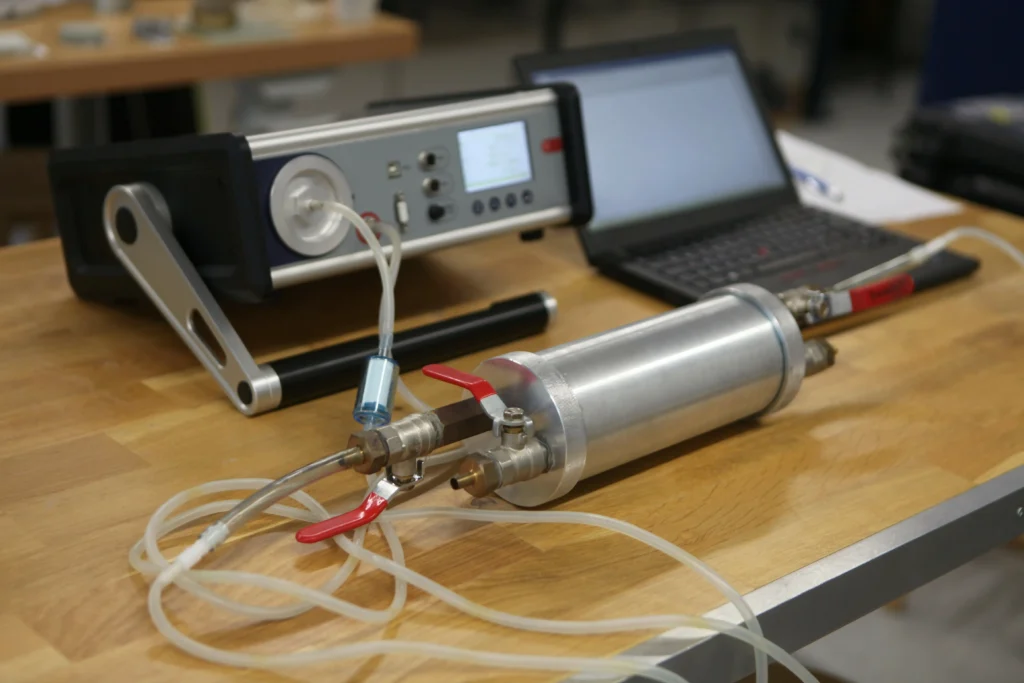Milledge Construction is committed to protecting Des Moines homes and businesses from radon gas. Radon mitigation is a proactive approach to protecting the health of the people living or working in your home or business. We recommend you do not wait for radon issues to escalate.
We make it easy to get your radon testing done in Des Moines! A certified radon professional will come to your location to perform a comprehensive evaluation. From there, we will present you with a clear report of our data to help customize your plan.
From designing a custom mitigation system to installation, we are focused on protecting Iowans from the effects of radon.
Regular maintenance and checkups help keep you safe. Call us for all of your radon testing and mitigation needs in Des Moines, IA.

Learn more about our radon testing services by calling (641) 218-5006 now.
Protecting your home and family or business starts with understanding and addressing potential radon gas hazards in your Des Moines, IA, home or building.
Radon is a colorless and odorless gas and can pose serious health risks, including an increased risk of lung cancer.
Here at Milledge Construction, our number one priority is your safety. Through superior radon testing and mitigation, our knowledgeable team can evaluate radon levels, provide you with a complete and transparent report of their findings, and then design a customized mitigation system for your home or business.
We install your system correctly the first time and monitor your radon levels regularly so you can live in a safe indoor environment.
Don’t let your radon levels get dangerous.
Contact Milledge Construction for radon testing and radon mitigation in Des Moines.

Radon is a radioactive gas that’s colorless, odorless, and tasteless, naturally forming as uranium breaks down in soil, rocks, and water. This gas can seep into buildings, like homes, hotels, schools, and apartments, from the ground and build up to dangerous levels, posing serious health risks over time.
Most people don’t know that radon is radioactive, meaning it’s a carcinogen. Long-term exposure and inhalation to carcinogens can significantly increase your risk of getting lung cancer. That’s why we are so passionate about radon testing and mitigation, to promote healthier living and working environments for Des Moines residents.
Contact us today for radon mitigation services.
Originating from the natural decay of uranium, which is present in almost all soils, radon typically ascends from the ground into the air and can infiltrate your residence through foundation cracks and other openings. Once inside, your home acts as a containment for radon, allowing it to accumulate. Radon issues are not exclusive to specific homes; any residence may potentially face a radon problem. Some common ways radon can seep into your home or building:
Small or large cracks in the foundation of your home provide direct entry points for radon to seep in.
Points where different materials meet, such as floor-wall joints or wall-wall joints, can create openings for radon to enter.
Spaces around pipes and other penetrations in the foundation or walls can serve as entry points for radon gas.
Homes equipped with sump pump basins, designed to prevent flooding, may be vulnerable to radon entry through gaps in or around the sump pump.
Radon can move through spaces within walls, especially if these spaces connect to the soil.
In some cases, radon can be present in well water. When water is used in the home for activities such as showering or cooking, radon can be released into the air.
Radon can move through the soil and building materials via capillary action, which is the ability of a liquid or gas to flow in narrow spaces without external forces.
Once inside the home, radon can be further distributed by ventilation systems, including heating, ventilation, and air conditioning (HVAC) systems.
If your home has a brick exterior, spaces between bricks can sometimes allow radon to enter.
Gaps or joints between the floor and walls can be potential entry points for radon gas.
Milledge Construction provides residential and commercial radon testing services throughout Iowa. You can also trust us to install or repair mitigation systems to prevent radon from pooling in your property. We have years of experience in this industry.
Please use the form on this page to email us. You can also call (641) 218-5006 to speak with us directly. Our team looks forward to hearing from you soon.